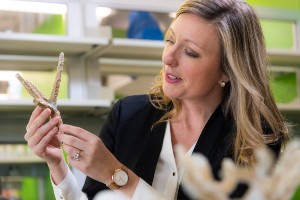Science Talks Webinars
The Science Talks webinar series will return in the spring, watch for details of our next presentation in April.
Recent Webinars

Science Talks: Environmental Chemistry: Safeguarding our Indoor Air
Breathing is fundamental to life, and most of us spend the vast majority of our time indoors. But have you ever stopped to consider what’s in the air we breathe inside our homes, workplaces, and schools? Maintaining clean indoor air is essential for protecting our health and well-being. However, indoor air quality is influenced by a mix of pollutants from both indoor activities and outdoor sources. Everyday actions, such as cooking or using certain appliances, can release pollutants into our living spaces. Meanwhile, outdoor air pollution—like wildfire smoke—can seep indoors, compounding the problem.
Join award winning chemist and faculty member Ran Zhao as he introduces key indoor air pollutants, with a spotlight on fine particulate matter, which poses significant health risks. He’ll share insights from two recent research projects and highlight the innovative use of low-cost air quality sensors that make these studies possible and show how science can help us breathe easier.
Science Talks: Protecting our oceans: Alien invaders and how to stop them
“Biological invasions” are a global problem created by people intentionally and unwittingly moving flora and fauna into environments where they don’t belong. This talk will explore the causes and consequences of 'biological invasions’, a global problem created by people intentionally and unwittingly moving flora and fauna into environments where they don’t belong. Today, thousands of invasive species threaten biodiversity and disrupt societies globally, and the problem is expected to intensify as our global climate continues to change. In searching for solutions, the talk will highlight innovative ways that communities are dealing with invasive species– from designing robots to creating cookbooks– and defending nature and local livelihoods in the process.
Join faculty member and Canada Research Chair in Aquatic Global Change Ecology and Conservation, Stephanie Green explain what invasive species are, why they are a problem and how they relate to our global and local communities, here in Edmonton, and what can be done to defend against invasive species and conserve threatened ecosystems.

Science Talks: Quantum Materials: From exotic particles to new technologies
To learn about the world at the most fundamental level, particle physicists use enormous machines called particle colliders. These devices cause atoms to collide head-on at very high energies — revealing the ultrasmall elementary particles that make up this matter, such as electrons and quarks. Condensed matter physicists have discovered that when the same matter is probed in table-top experiments at much lower energy and temperatures where quantum effects manifest, matter often behaves as though it is made up of new particles very different from electrons and quarks. In this webinar, Joseph Maciejko explains how theoretical physics can help us identify new kinds of materials hosting “exotic particles.” These very foundational discoveries are what is advancing quantum science and will have vast implications for the technology we use every day — with potential applications in communications, computing and data security.
View Recording
Previous Webinars
Cannabis use in the modern era: The highs and lows
Artificial Intelligence - What can language models tell us about the brain?
Climate change on Canada's highest peak
Software Development - Building Better Code through Reuse
Rural Sustainability in Alberta with Bob Summers
Keeping hives alive: Behavioural defence of honey bees against disease with Olav Rueppell
Electric potential: Extracting lithium from waste in Alberta with Dan Alessi
Chasing a cure: New tools in the fight against COVID-19 with Fred West
Brain immune cells - the new frontier in neurodegeneration with Matthew Macauley
ARCHIVES
May: Sleep to remember with Clayton Dickson
April: The Evolution of Ethics in AI with Eleni Stroulia and Nidhi Hegde
February: COVID-19 modelling demystified with Marie (Betsy) Varughese and Michael Li
January: Fostering coexistence over conflict with urban coyotes through evidence-based methods with Colleen Cassady St. Clair
December: Taking Control of the Quantum World: Developing new technologies using ultracold atoms with Lindsay LeBlanc
November: Data permutations: How to understand human speech, the spread of COVID-19, and the Alberta electorate with Adam Kashlak
October: Searching for life outside of Earth: NASA’s Mars 2020 Perseverance Rover Mission with Chris Herd
September: Eavesdropping on communication in wild bats and mice with Matina Kalcounis-Rueppell
August: Community Approaches to Housing Affordability with Joshua Evans
July: The science of Rock, Paper, Scissors with Ben Dyson
June: Perspectives from new Canadian Arctic Ice Cores with Alison Criscitiello
May: Cretaceous Dinosaurs in Northern Alberta with Corwin Sullivan
April: Glycomics- Sugars and Human Health with Lara Mahal
